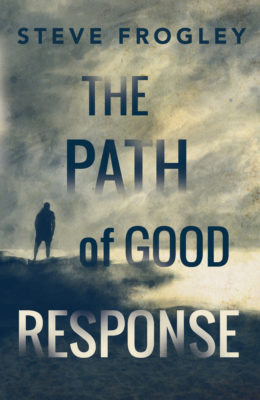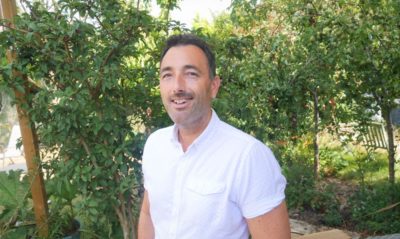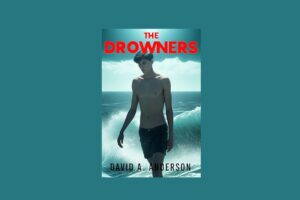Unsurprisingly, I have been truly spoilt with dystopian reads this year. It’s been like Christmas every day – except the gifts are life-sapping hopelessness, misery and resentment.
And Steve Frogley’s The Path of Good Response is one of the gifts I’m most excited about unwrapping, especially as it has such a compellingly mysterious blurb:
Do you value your mother’s health above peace in the Middle East? How about your career over global warming?
If a company runs the best graduate scheme in the world, then can it afford to be probing with its interview questions?
When Joe Massey is offered a role aboard Schelldhardt’s luxurious headquarters at sea, he discovers that the company mission is beyond anything he had ever imagined. Strange dreams disturb his sleep, and it soon becomes clear that nothing is quite as it seems.
Is he really the right man for the job? And if not, then why is he there at all?
I will be reviewing The Path of Good Response at a later date, but for now Steve has kindly permitted me to publish the excerpt ‘Phobia’, which you can read below. It is an incredibly nightmarish, fantastical scene that’s so rich with imagery, if you don’t taste the salty sea air and feel its brisk coldness, you’ve seriously read it wrong.
And if you’re as intrigued by this novel as I am, you can get it from Pegasus Publishers’ website, or on Amazon. You can also visit Steve’s website and follow his Twitter to find out more about him.
But for now, please enjoy ‘Phobia’.

Phobia
‘Focus,’ said the voice in the darkness. ‘You are sitting on a beach, facing the sea…’
As the blackness transformed around him, Joe could feel the wind whipping across the sand. Rays of sunshine filtered through the clouds, casting gangly shadows along the length of the shingle-covered beach. It was a place he somehow knew, but he couldn’t recall being there before.
‘I said, do you want a beer?’ asked the bemused young man sitting next to him. He was wearing a wetsuit, with an expensive-looking camera dangling from his neck. There was a can of lager in his hand that he waved like a friendly glove puppet.
‘Yes, sorry,’ laughed Joe. ‘I was miles away.’ Dixon shook his head, exasperated, and passed him the can. Joe pulled back the ring, ducking to meet the frothing beer.
‘I’m going to get some close-up shots,’ Dixon said, clambering to his feet. He picked up a pair of fins from the sand, and limped through a patch of stones that separated them from the water.
Joe was taken aback when he looked up; there were seals and sea lions all the way along the shore, some playing in the breaking waves, some basking at the edge of the water. They were a variety of sizes and colours: a subtle spectrum of browns, greys and black. Their sleek bodies, powdered by sand, slipped effortlessly in and out of the waves — their grace in the water as pronounced as their clumsy blundering along the sand. As beautiful as the sight was, there was something that instantly disturbed Joe about it. His arms were covered in goose-pimples, though it wasn’t the chill of the breeze that was the cause: he knew this place, and he knew that he didn’t want to be here.
It was an irrational feeling. There was no one else on the beach. Dixon was crouched near the water’s edge, his camera held in front of him in an exaggerated artistic pose. Everything was perfectly normal.
‘The peninsula Valdés is a unique nature reserve,’ said an unseen voice. Joe froze when he heard the words in the air — the familiar American accent, triggering fear deep in his subconscious. ‘This sparse landscape is situated in the Argentinian province of Chubut on the Atlantic coast,’ the man continued.
Joe knew his voice, but he associated it with something else; it belonged to this beach, but in a different way that he couldn’t quite recall. Something from his childhood. Something he had forgotten about. Had he imagined the words? There was no one else in sight for miles around them.
He hobbled barefooted towards the water, feeling every stone and shell underfoot. The hoarse barking of a sea lion stopped him in his tracks a few feet short of the water’s edge.
‘I think we should go,’ he said to Dixon, who was further advanced, still taking photographs.
‘Are you crazy? I’ve been waiting all day for this light. It’s perfect now,’ Dixon replied, not stopping to turn around. He continued photographing in his affected pose.
Joe stood by the water’s edge, hugging himself. It was incredible how much colder it was just these few feet nearer the sea. He wanted them both to leave. Something was wrong.
‘I’ve got a bad feeling.’
‘About what?’ Dixon laughed, still crouched.
‘I don’t know. Déjà vu. Something isn’t right.’
‘How can you have déjà vu when you haven’t been here before?’ Dixon replied, still snapping at his camera. It was a fair point, but there was something so familiar about the scene that he couldn’t explain.
‘The peninsula Valdés is of particular interest because of the diversity of marine animals that frequent its waters; a variety of different seals can be found along the coastline, as well as dolphins, and additionally, southern right whales in the Golfo Nuevo. But it is the behaviour of one particular marine mammal that commands the greatest attention here,’ said the American voice, again from nowhere.
‘Did you hear that?’ said Joe.
‘Hear what?’ laughed Dixon.
‘The voice,’ Joe replied. But even as he spoke, something was changing. Dixon and the landscape were slipping out of focus, as though there was static interference in the air, like old film footage. It was as if he was watching the scene on television, only he was immersed in the programme in some way. He could hear music. Background music that he remembered from his childhood nightmares.
‘I can’t get the shots I want,’ said Dixon, pulling on his fins at the water’s edge. ‘I’m going to get closer to them.’
‘I don’t think that’s a good idea.’
‘I’m only going as far as the water’s edge,’ Dixon said, pulling the rubber hood of his wet suit over his head. ‘Please don’t project your irrational swimming phobia on to me.’ He turned onto his stomach in the surf, waving the fins on his feet behind him. ‘If one wants to photograph seals, one has to become more seal,’ he laughed, before barking and clapping his hands together in front of the dangling camera.
‘Don’t do that!’ Joe shouted, stepping as close as he dared. Dixon only barked more in response.
‘Two males taught the population this unique trick, and the knowledge has been transferred from generation to generation by these very intelligent, social mammals,’ said the American’s voice. Joe recognised the words verbatim, and shook with fear.
‘Get out!’ he shouted at Dixon, who continued to wiggle his flippers in the air.
He was beginning to remember. A wildlife documentary when he was a young child. The voice of the narrator, the aspect of the beach, it was all the same, and it had stayed with him forever.
Joe could picture the scene before it happened. A large wave came rolling into the shore behind Dixon, exactly as he recalled it. As it rose to its greatest height before breaking, Joe could see a dark shape within it that chilled his blood. It seemed impossible that something so large could be so close to the shore, yet its arrival was inevitable.
‘Get out now!’ he screamed at Dixon, who turned at that exact moment to follow his terrified stare. The huge black and white head of the orca was now visible, larger than in his worst nightmares. The dorsal fin stood like a mast above the wave, as the whale launched itself towards the shoreline where Dixon was lying. The wave parted around the orca until its entire body was visible, beached in the shallows. The seals scattered in different directions, but Dixon couldn’t scramble to his feet quickly enough, and the whale’s jaws closed around his legs, shaking him from side to side, before throwing him into the surf directly in front of Joe.
‘Help me!’ Dixon screamed, extending his arm towards Joe, only a few feet away from where he stood. All he had to do was step forward into the water and pull him to safety, but he was frozen with fear. ‘Please!’ screamed Dixon, stretching his fingers towards him.
The whale wriggled on the shingle to adjust its position and turn towards them. It was so close, and so terrifyingly huge. He watched, petrified by fear, unable to step forwards or backwards. He wanted to save him, but he couldn’t move.
‘Don’t worry,’ said a familiar voice next to him.
Joe’s mother was standing beside him on the sand. She crouched and put her arm around his tiny shoulder. He was crying.
‘Can they come all the way up the beach, Mummy?’
‘No, darling. And they only eat seals,’ she smiled.
‘Help me!’ Dixon screamed, thrashing about in a crimson foam. Joe stood, watching helplessly, and in an instant the orca had Dixon between its jaws again, dragging him out to sea.
‘I’m never going to swim, Mummy,’ he said.
Joe was in darkness.
He had no memory of where he was or why he was there, but he was shaking violently.
‘What am I doing here?’ he said.
‘I want you to picture something for me,’ said a voice. ‘You are sitting on a beach, facing the sea.’
Rachel was pinned beneath him in the sand. His shoulders heaved uncontrollably as he held her tightly, his face pressed against her wetsuit.
‘What’s wrong?’ she said. ‘You’ll break the camera.’
‘No more photographs. Not today,’ he panted, as familiar music filled the air around him. ‘We’re going home.’
Darkness.
‘We have a problem,’ said the voice. ‘I cannot allow this to happen again.’
About the author

Steve is a writer of contemporary fiction, who enjoys reading books of many different genres.
Originally from Southend in Essex, Steve now lives on the South Coast of England with his family, after a few happy years spent in New Zealand. The Path of Good Response is his first novel. He has spent most of his working life in the IT industry, but writing is his real passion.
The workplace has changed a great deal during Steve’s career. He started writing The Path of Good Response back in 2016, and the fictional company in the novel, Schelldhardt, seems less of an exaggeration by the year. It appears that reality is fast catching up with dystopian writing, and in many ways overtaking it. He hopes that you enjoy reading his book, and welcomes any feedback.




Leave a Reply